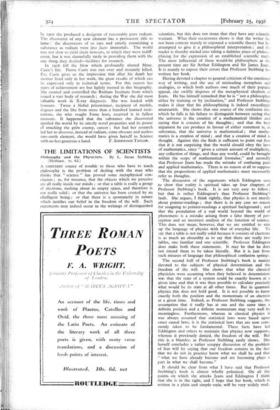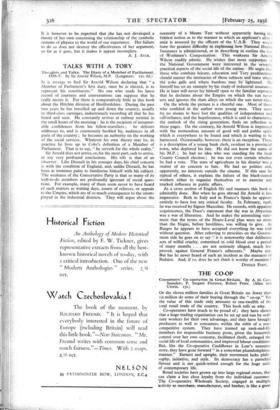THE LIMITATIONS OF SCIENTISTS
A CONSTANT source of trouble to those who have to teach philosophy is the, problem of dealing with the man who thinks that " science ". has proved some metaphysical con- clusion ; as, for instance, that the objects which 'we perceive are all really inside our minds ; or that a table is really a group of electrons, rushing about in empty space, and therefore is not really solid ; or that the universe has been created by an intelligent being ; or that there is a spontaneity in nature which justifies our belief in the freedom of the will. Such statements may indeed occur in the writings of distinguished
scientists, but this does not mean that they have any scientific *arrant. What their occurrence shows is that the writer ha, not been content merely to expound a scientific theory but ha , attempted to give it a philosophical interpretation ; and the reader is thereby misled into taking a dubious piece of philoso- phising for the expression of an established scientific truth. The most influential of these would-be philosophers at the present time are -Sir Arthur Eddington and Sir James Jeans. It is mainly to expose their errors that Professor Stebbing has written her book.
Having devoted a chapter to general criticism of the emotional way of writing, and the use of misleading metaphors and analogies, to which both authors owe much of their popular appeal, she swiftly disposes of the metaphysical idealism of Jeans. He has himself remarked that he is " not a philosopher either by training or by inclination," and Professor Stebbing makes it clear that his philosophising is indeed exceedingly amateurish. She shows that one source of the confusion into which he falls is his failure to distinguish between saying that the universe is the creation of a mathematical thinker and saying that it consists of his thoughts ; and that the best argument he can produce in favour of either statement is, in substance, that the universe is mathematical ; that mathe- matics is a creation of mind ; and that a creation of mind is thought. Against this she finds it sufficient to point out first that it is not surprising that the world should obey the laws of mathematics, since " given a certain amount of multiplicity, any collection of things, and thus any world, could be brought within the scope of mathematical formulae," and secondly that Professor Jeans has made the mistake of confusing pure and applied mathematics. There is no reason at all to suppose that the propositions of applied mathematics must necessarily refer to thoughts.
The discussion of the arguments which Eddington uses to show that reality is spiritual takes up four chapters of Professor Stebbing's book. It is not very easy to follow; but that is rather Eddington's than Professor Stebbing's fault. She argues, I think rightly, that physics is not merely about pointer-readings ; that there is in any case no reason for assigning to pointer-readings a spiritual background ; and that the postulation of a real world beyond the world of phenomena is a mistake arising from a false theory of per- ception and an incorrect analysis of the function of science. This does not' mean, however, that we are entitled to mix up the language of physics with that of everyday life. To say that a table is not really solid because it consists of electrons is as much an absurdity as to say that there are really two tables, one familiar and one' scientific. Professor Eddington does make both these statements. It may be that he does not intend them to be taken literally. But it is just from such misuses of language that philosophical confusion springs.
The second half. of Professor Stebbing's book is mainly devoted to the subjects of physical determinism and the freedom of the will. She shows. that what the classical physicists were assuming when they believed in determinism was that the state of a system could be exactly known- at a given time and that it was then possible to calculate precisely what would be its state at all other times. But in quantum physics this does not hold good. It is not possible to know exactly both the position and the momentum of an electron at a given time. Indeed, as Professor Stebbing suggests, the assumption that it really has at one and the same time a definite position and a definite momentum may very well be meaningless. Furthermore, whereas in classical physics it was always assumed that statistical laws were based upon exact causal laws, it is the statistical laws that are now com- monly taken to be fundamental. These facts have led Eddington and others to maintain that physics now supports, whereas it previously denied, the freedom of the will. But this is a blunder, as Professor Stebbing easily shows. She herself concludes a rather scrappy discussion of the problem of free will by saying that our freedom consists in the fact that we do not in practice know what we shall be and that " what we have already become and are becoming plays a part in what we shall become."
It should be clear from what I have said that Professor Stebbing's book is almost wholly polemical. On all the points on which she attacks Jeans and Eddington I think that she is in the right, and I hope that her book, which is written in a plain and -simple-style, -will be very widely read. It is - however to be_regretted that she haS.-not- developed a - theory of her own concerning the relationship of the symbolic systems of physics to the world of our experience. Her failure to do so does not destroy the effectiveness of her argument, so far as it goes, but it makes it appear incomplete.
A. J. AYER.

















































 Previous page
Previous page